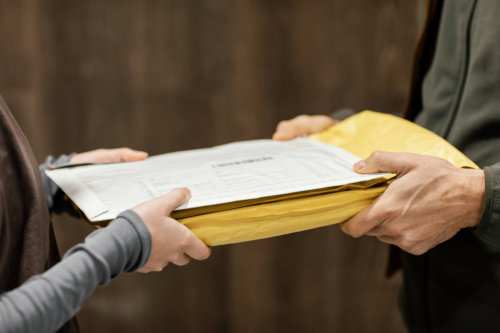
04 Jan Legal Guidelines for Responding When a Process Server Arrives at Your Door
When a process server knocks at your door, it’s essential to approach the situation from a legal standpoint to ensure that your rights are protected and that you comply with legal requirements. Here’s a comprehensive guide on what to legally do when a process server arrives at your:

1. Verify the Identity of the Process Server:
Upon opening the door, it’s important to request proper identification from the process server to confirm their identity and credentials. In the UK, process servers are typically required to carry identification that indicates their role and the company they represent. Take note of their name, company, and contact details for future reference.
2. Accept the Documents:
Legally, you are generally required to accept the legal documents that the process server presents to you. Refusing to accept the documents may not prevent legal proceedings from moving forward. Politely accept the documents and avoid signing anything unless you fully understand the content and implications.
3. Review the Documents:
Once you have received the legal documents, carefully review their contents. The documents may include information about the nature of the case, court dates, deadlines, and the parties involved. It’s important to fully understand the documents and their implications.
4. Seek Legal Advice:
After the process server leaves, consider seeking legal advice from a qualified solicitor. If you are unsure about the nature of the legal documents or their implications, a solicitor can provide you with guidance and help you understand your rights and responsibilities.
5. Comply with Legal Deadlines:
If the legal documents include deadlines or instructions, it’s crucial to comply with them. Failing to meet legal deadlines could have serious consequences for your case. Consulting with a solicitor can help you understand and meet any legal obligations.
6. Maintain Records:
From a legal standpoint, it’s advisable to keep detailed records of the interaction with the process server, including their identification, the date and time of the visit, and any relevant documents provided. These records may be valuable in the event that you need to reference the interaction later.
7. Maintain Confidentiality:
As legal matters can be sensitive, it’s important to maintain confidentiality regarding the legal documents and any information related to the case. Avoid discussing the case with anyone other than your legal representative.
8. Communicate with Legal Professionals:
Throughout the legal process, maintain open and transparent communication with your solicitor. Your legal representative can provide you with advice, guidance, and appropriate steps to take based on the specifics of your case.
9. Take Legal Action if Needed:
If you believe that your rights have been violated or if you have concerns about the legitimacy of the legal documents or the process server’s conduct, consult with your solicitor to determine whether legal action is warranted.
Conclusion: Ensuring Legal Compliance
When a process server arrives at your door, approaching the situation from a legal standpoint is crucial to safeguard your rights and ensure legal compliance. By following these guidelines and seeking professional legal advice, you can navigate the situation effectively and make informed decisions regarding your legal rights and responsibilities.
Disclaimer: This article is intended for informational purposes only and should not be considered legal advice. For personalised legal guidance, consult a qualified solicitor.

